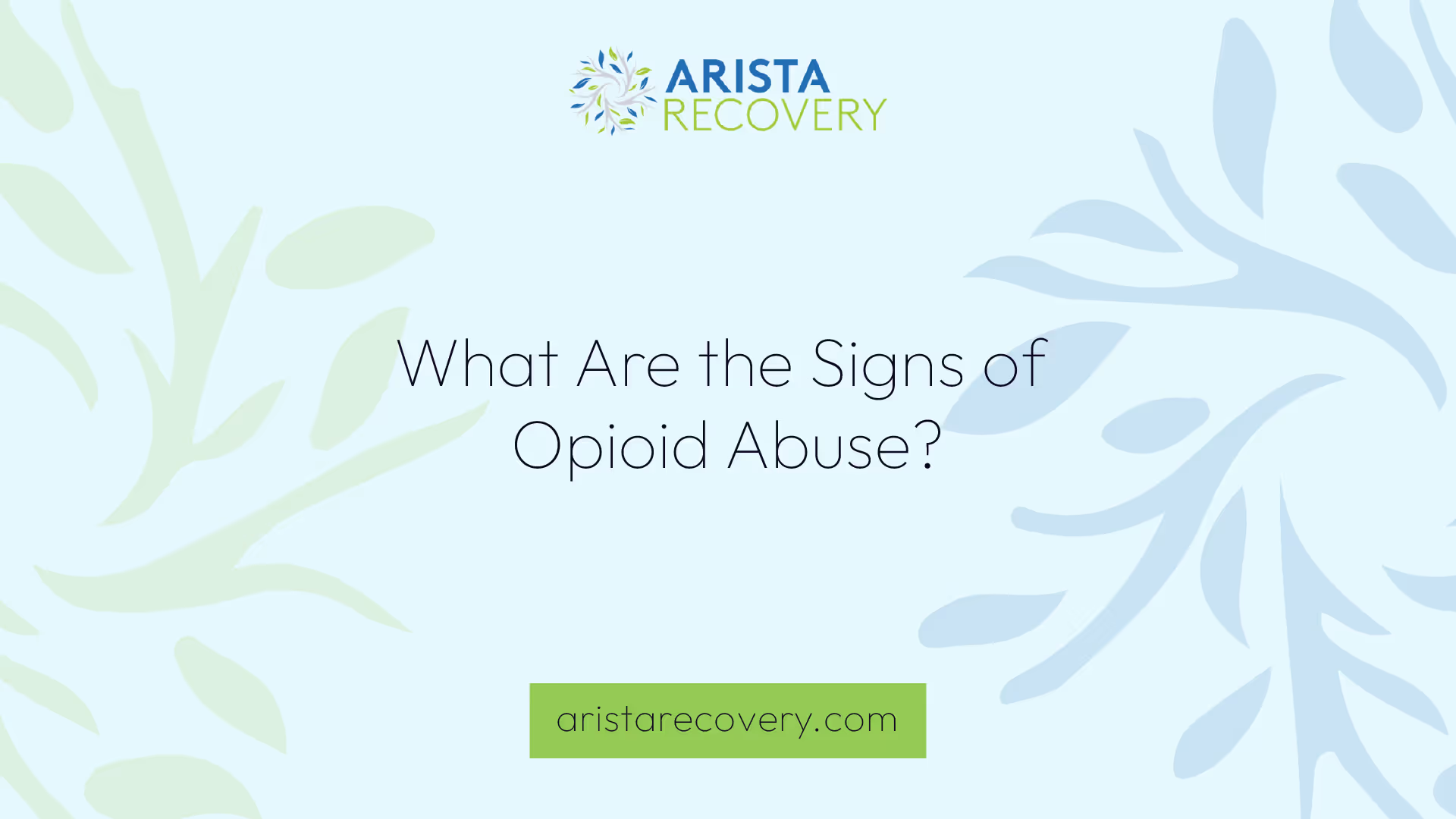
What Are the Signs of Opioid Abuse?
Opioid abuse continues to be a significant health and social crisis in the United States. The CDC reports that 110,236 people died in the 12 months due to opioid abuse. Additional information provided by the National Institutes of Health shows that roughly 21 to 29% of patients prescribed opioids for chronic pain misuse these medications. Additionally, 80 percent of those who abuse heroin started out abusing opioids.
Opioid abuse is life-threatening and destroys the lives of users, their families, and other loved ones. You will learn more about opioids, the signs of opioid abuse, and where you can find narcotic addiction treatment in Kansas City. Arista Recovery provides a top-notch opioid treatment that is evidence-based, effective, and personalized to meet each individual’s needs. If you are struggling with opioid addiction, call Arista Recovery right now and learn more about our Kansas City drug and alcohol rehab center.

What Are Opioids?
Opioids are potent pain-relieving medications created by scientists in a laboratory. Opioids mimic the effects of naturally occurring opiate drugs such as heroin and morphine. Common opioid medications prescribed by doctors include the following:
- Vicodin
- Percocet
- Percodan
- Fentanyl
- Codeine
Opioids are commonly prescribed as a pain reliever after surgical procedures, and they are utilized for those with sports injuries as well as those who suffer from cancer. Opioid medications are highly effective when utilized as a part of a comprehensive pain management plan. However, these drugs are extremely powerful and have a high potential for dependence and addiction if not carefully prescribed, administered, and monitored by experienced medical personnel.
Are Opioids Addictive?
Even if only used for the short term, opioids are highly addictive and dangerous to one’s health. Opioid addiction occurs because these medications release enormous amounts of endorphins in the brain. Endorphins are the brain’s natural “feel good” chemical. Endorphins act on the reward centers in the brain and mute perceptions of pain while boosting feelings of pleasure. This creates a short period of intense euphoria. Once the effect wears off, you are likely to take more opioids in order to get those good feelings back.
As you continue using opioids, your brain will slow the production of endorphins, and the doses you took no longer produce the desired feelings. This increased tolerance leads you to take higher dosages. After a more extended period, your brain may quit producing endorphins altogether. As a result, you will need to take opioids in order to function, which leads to addiction.
Can Opioids Cause an Overdose?
If you are in the grips of opioid addiction, chances are high that you may experience an overdose. An overdose can occur if you take high daily dosages or combine opioids with other drugs or medications. Overdose occurs when the amount of the drug overwhelms the body and interferes with the body’s autonomic functions such as respiration and breathing. Signs of an opioid overdose include:
- Unresponsiveness or unconsciousness
- Slowed or stopped breathing
- Snoring or gurgling sounds
- Cold or clammy skin
- Discolored lips or fingernails
What Are the Signs of Opioid Abuse?
For the majority of people who take opioid medications, they use them responsibly and take the prescribed dosage, and will talk to their doctor if their condition changes or if the medication are negatively affecting their daily life. However, the high addiction potential of prescription painkillers causes some people to use these medications in ways that are not intended.
One of the common signs of opioid abuse includes taking these medications as a “failsafe” and when they are not experiencing pain. Other signs of opioid addiction include noticeable and unpredictable mood swings and changes in sleep patterns. Those struggling with opioid addiction have poor decision-making skills, will borrow or steal other people’s medications, and will go to multiple doctors (a practice called doctor shopping) in order to obtain opioid medications.
Additional signs of opioid addiction include:
- Increased anxiety attacks
- Depressive episodes
- Abandoning work, school, and family responsibilities to procure and use opioid medications
- Shallow breathing and lowered respiration
- Physical agitation
- Increased irritability
Finding Opioid Treatment in Kansas City
Recovering from opioid abuse requires professional help. While many rehabs offer opioid abuse treatment, finding an evidence-based and proven effective program can be challenging. Arista Recovery provides a fully integrated model of care featuring a fusion of traditional and holistic approaches tailored to meet your needs. We offer multiple levels of care and are experienced treatment professionals with a successful track record in helping people get and stay sober. Artista Recovery offers the full continuum of care in the Midwest. The time is now; call Arista Recovery toll-free today and take back control of your life.
When mental health challenges and addiction intersect, it can feel isolating. At Arista, we offer compassionate, evidence-based, and trauma-informed care to help you heal, grow, and move forward.
You’re not alone in this.
When mental health challenges and addiction intersect, it can feel isolating. At Arista, we offer compassionate, evidence-based, and trauma-informed care to help you heal, grow, and move forward.
Support that moves with you.
You’ve taken a brave first step. At Arista Recovery, we’re here to help you continue with best-in-class care designed for long-term healing and support.
.webp)






